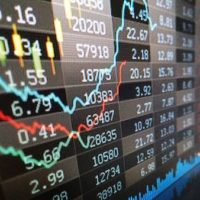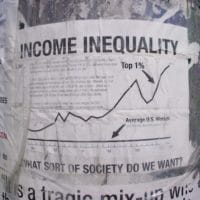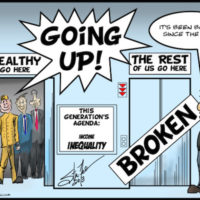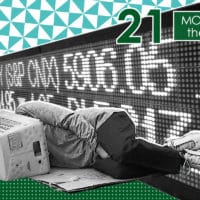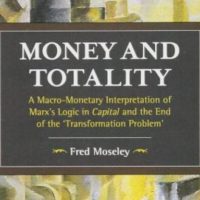-
Why coronavirus could spark a capitalist supernova
There is no magic money tree – the ‘rescue packages’ aim to rescue a rotten system, and won’t work.
-
Yanis Varoufakis on the economic and political impact of the Coronavirus | DiEM25
Yanis Varoufakis, DiEM25 co-founder and MeRA25 MP, on the economic and political impact of the coronavirus.
-
Building Capacity with Money on the Left
This month’s Money on the Left episode departs from the show’s regular interview format to reflect on the past, present and future of the Money on the Left project as a whole. We focus, in particular, on a recent special scholarly journal issue dedicated to Money on the Left, which was published by Liminalities: A […]
-
Climate change and the class divide
No, we’re not all in it together. Our rulers are responsible for the system that’s creating an ecological catastrophe. As that crisis intensifies, it’s exposing and intensifying the divide between us and them.
-
Capitalism, socialism and over-production crises
Unlike capitalism, socialism avoids any waste or slack, such as is caused by an over-production crisis, by raising the consumption of workers appropriately to avert it.
-
Rosa Luxemburg and debt as an imperialist instrument
In her book titled The Accumulation of Capital, published in 1913, Rosa Luxemburg devoted an entire chapter to international loans in order to show how the great capitalist powers of the time used the credits granted by their bankers to the countries of the periphery to exercise economic, military and political domination on the latter.
-
World’s super rich meet in Davos to discuss the climate change problem they created
Research has shown that the people most responsible for a warming planet were disproportionately the same people attending the summit and an increasing number of observers see climate change, inequality and capitalism as bound together.
-
A Stock Market boom is not the basis of shared prosperity
The U.S. is currently enjoying another stock market boom which, if history is any guide, also stands to end in a bust. In the meantime, the boom is having a politically toxic effect by lending support to Donald Trump and obscuring the case for reversing the neoliberal economic paradigm.
-
When it comes to pay, U.S. business leaders are world champs
U.S. CEOs not only draw the highest salaries (including bonuses and equity awards, etc.), but they are king of the hill when it comes to lording it over their employees, as illustrated by the high ratio of CEO to worker earnings.
-
What inequality?
Economic inequality in the United States and around the world is now so obscene, and has convinced more and more people to do something about it, that the business press has initiated a campaign to deny its very existence.
-
Covering the Paradigm Crisis with Alexandra Scaggs
Alexandra Scaggs joins Money on the Left to discuss her experience covering the ongoing paradigm crisis in mainstream economics, central banking and finance—and why leftists should be paying close attention.
-
Is degrowth an alternative to capitalism?
In what follows, I will first briefly summarize the core arguments of the book, which promises to provoke important discussions on the matter of limits and subjects. Then I will reflect on the fuzziness of the primarily cultural conceptualization of capitalism, and argue that neither self-limitation nor degrowth qualifies as a mode of production, such that they could constitute an alternative to capitalism.
-
Sanders report shows how Millennial generation is ‘being punished with crushing student debt and low-paying jobs’
“In the richest country in the history of the world, we have an obligation to turn this around and make sure our kids live healthier and better lives than we do.”
-
End of the free trade myth
“Is that a big deal?”, some may ask. It is to those who have pushed for achieving the far-reaching liberalisation of trade in an unequal global order, first under the General Agreement on Tariffs and Trade (GATT), and then under the auspices of the agreements that established the WTO and defined and expanded its remit.
-
Neoclassical Marxism (Christmas Special) with @NMarxism
This December, we bring you a special Christmas episode of our program, featuring the enigmatic operator behind the increasingly popular Twitter account known as “Neoclassical Marxism,” or @NMarxism. @NMarxism is a deeply satirical Twitter project, which deploys Modern Monetary Theory and some very dark humor to critique the neoclassical economics and neoliberal assumptions that unconsciously […]
-
Changing the subject
From Chile to Lebanon, young people are demonstrating—in street protests and voting booths—that they’ve had enough of being disciplined and punished by the current development model.
-
No Depression in Heaven with Alison Collis Greene
In this episode of Money on the Left, we speak with historian Alison Collis Greene about her book No Depression in Heaven with an eye toward contemporary debates around the Green New Deal. Subtitled The Great Depression, the New Deal, and the Transformation of Religion in the Delta, Greene’s book critiques what she calls the […]
-
Climate change affects the German economy
In 2018, one of the longest dry spells on record left part of the Rhine in Germany at record low levels for months, forcing freighters to reduce their cargo or stop using the river altogether.
-
Money Politics before the New Deal with Jakob Feinig
Jakob Feinig, assistant professor of human development at Binghamton University, joins Money on the Left to discuss the history of political organizing and activism around money in the United States, from the pre-Revolutionary period to the New Deal era. Characterized alternately by periods of widespread “silencing” and mass mobilization, the history of money politics that […]
-
Review of Money and Totality by Fred Moseley
Today, as the global economy flounders from crisis to crisis, Marx’s analysis of capitalism is the essential basis for a correct understanding of what is going on. Moseley’s book reaffirms key elements of this analysis.








